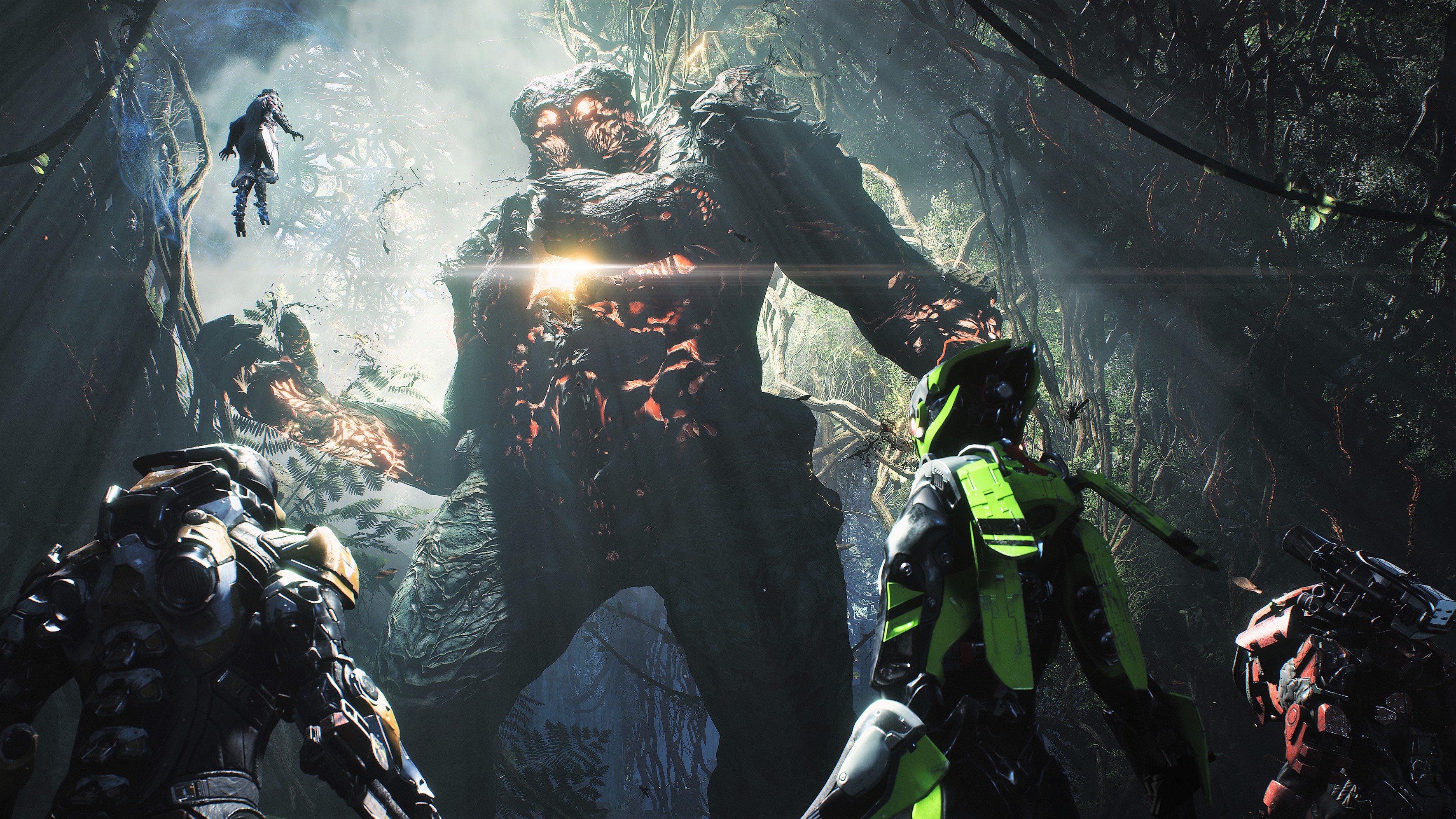In February 2019, Dragon Age and Mass Effect developer BioWare released Anthem, a third-person shooter about human Freelancers donning armored Javelin suits to fight monsters and various factions. After seven years, EA is permanently taking the live-service game down on January 12, 2026, and with it, a chapter in the studio’s modern era is forever gone.
To know Anthem is to know its tumultuous life; the game famously suffered from crunch and internal struggles owing to BioWare’s knowledge of separately developing multiplayer games and third-person shooters—thanks, respectively, to Star Wars: The Old Republic and its Mass Effect series—but not having the expertise to make an ongoing multiplayer third-person shooter. But at the time, we didn’t know that; we just saw a game with four-player co-op about flying around big, expansive environments in sick mech suits with cool powers. At a time when the live-service shooter market was mainly just Destiny 2 and Warframe, it seemed like this could be another winner in that lineup.
 © BioWare/EA
© BioWare/EABut that didn’t happen. While it had a really great initial reveal, Anthem launched to mixed reviews and players running out of things to do fast. BioWare tried to steer things in a better direction with free DLC and a proposed rework, even going so far as to detail what specific ideas they hoped to implement. From increased drop rates to sky pirates and deeper Javelin build customization, it all sounded promising in concept, and seemed like the type of reboot that could really turn things around. Come 2021, EA opted to end future development; BioWare refocused on single-player games with the Mass Effect remasters and Dragon Age: The Veilguard, the latter of which started as a live-service game and had those elements mostly stripped out.
Anthem’s place in video game history is…kind of complicated. Its short life aside, it actually did fairly well commercially, with 5 million copies sold within its lifetime. Over the years, I’ve revisited it on PC and PlayStation and it’s generally been easy to join or start a session. That clearly shows signs of an affection for the game, and in the time before EA’s fateful decision, there was genuine support at it potentially getting a second shot at life a la Final Fantasy XIV and Destiny: The Taken King. That turnaround was somewhat undermined by the weeks and months leading up to the game’s release, where it was nitpicked to hell and back and people were cynical enough to openly hope the game would fail. Some thought it didn’t look good and was forced onto the developer by EA, others were just being mean and decided this was the game to dunk on because it represented current gaming trends they didn’t like.
Not a condemnation, just a general fact: every year, there’s at least one triple-A game everyone decides to work their industry frustrations out on, and that year, it just happened to be Anthem. That doesn’t take any of the sting away when the object of ire is something you enjoyed and wished others would understand why or lighten up on, or how that desire for blood has evolved into full-on hate campaigns and harassment toward developers of more recent titles. But Anthem’s true legacy is one of a dodged bullet: over the years, similar attempts by publishers to end Destiny 2’s reign (and that of fellow live-service giants like Fortnite and GTA Online) haven’t exactly gone to plan. In many cases, those games’ ends hit much harder than Anthem, and these days, a game’s end can take much (or all) of a developer’s staff with it. Not all of them get the dignity of having their servers left intact, let alone for nearly an entire decade.
In that sense, BioWare was lucky, but only just so. Pre-release, Anthem was viewed by the optimistic as a potential redemption for the studio following the underperformance of 2017’s Mass Effect: Andromeda, which has since had its own moment in the sun despite an equally rocky development and initial mixed reception. Anthem is arguably more of a black mark on the studio more than Andromeda since it was a new IP that lacked the safety net of an established franchise. Since both games’ releases, questions of BioWare’s future have grown in volume alongside the realization EA has repeatedly jerked the studio around on its recent projects and foisted unrealistic expectations foisted on those games. (And this isn’t the only EA subsidiary burdened with this.) The publisher just wants its money makers, but lacks the sense to get out of its own way and let the developers do what they do best so to can make the hits they’re all capable of, a troubling trend throughout 2025 and years past.
Saying Anthem is going out with a whimper might be generous; unlike Star Wars Battlefront II’s recent resurgence, it never really had a moment to reinvigorate its player base. (A Steam release might’ve made that possible.) Most seemed content to move on unless it was time to talk about BioWare and EA’s current issues, or ill-advised live-service forays that seemed a good idea years earlier. Maybe that’ll change closer to the servers going offline in January, maybe former developers will reminisce or throw shade about its rocky development or what they hoped to do with that rework. Regardless, the game we got is the game we got, and for all the snarking about it that’s due to come in the next six months, there’ll likely be about as much fond memories of its initial potential and those fun moments of flying around and pulling off combos in between the monotony and grind.
At best, Anthem is passable bordering on Fine, but now comes off like a miracle that it got to exist and have enough time to breathe before it met its unceremonious end. Will always wish it were better and got to see its course correction through to the end, but at least I got some barrel rolls and good music out of the experience.
Want more io9 news? Check out when to expect the latest Marvel, Star Wars, and Star Trek releases, what’s next for the DC Universe on film and TV, and everything you need to know about the future of Doctor Who.









 English (US) ·
English (US) ·